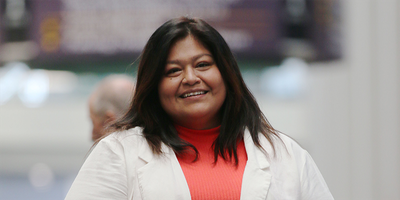Months before the 226th General Assembly got underway this week, Global Language Resources (GLR) was working to ensure that key participants whose primary languages are Spanish and Korean would be able to fully participate.
“The church has been intentional in trying to provide language access for many of our folks so they can be included at the table and the decision-making table,” said Stephanie Vasquez, manager of GLR.
To achieve that goal, the five-person team has been working in earnest since February to ensure that things go well, said Vasquez, a native of Peru who was turning things over in her mind even earlier than that.
“I usually start planning my next year around the end of November,” she said. “I really enjoy making sure that everything is covered.”
GLR handles both translation and interpretation. It also is in charge of “providing the appropriate training for the folks that will be involved in the processes,” Vasquez said. When it comes to General Assembly, there are “many moving pieces,” including making sure that commissioners and delegates understand the process well enough to participate.
One of the biggest tasks that GLR undertakes for the General Assembly is translating written material, such as overtures, reports, rationales, amendments to the Book of Order, commissioner resolutions and the moderator candidate booklet. That amounts to “thousands and thousands of words,” Vasquez said.
GLR’s work is done in coordination with the Office of the General Assembly’s Kate Trigger Duffert, director of General Assembly planning. Vasquez, who speaks multiple languages, including Spanish, French and English, has managed GLR since 2022.
“We're happy to serve,” said Vasquez. After experiencing four different models of GA since 2013, what’s helped me is “being adaptable to the changes, and if you keep that mindset, it (the work) will be challenging, but at the same time, it’s rewarding to see what we accomplished at the end.”
Providing information in Spanish and Korean is not just a courtesy; it is the result of General Assembly action taken more than a decade ago, so the church would begin providing essential resources to “major non-English language groups, specifically Korean and Spanish.” Additionally, GLR is accommodating a guest from the United Presbyterian Church of Brazil who speaks Portuguese.
Along with hiring enough interpreters and translators, GLR tries to ensure that they have the correct background for the subject matter. “For example, right now, we are seeing a big focus on the new unified budget,” Vasquez said last week. “That means that we have to find the people that have that background on that topic or that (have) worked with us in previous years.”
Some GA pages, such as myga.pc-biz.org, can be switched by the user to Spanish or Korean. In committees, participants such as Layra Serrano, a Spanish-speaking Young Adult Advisory Delegate from the Presbiterio de San Juan, could be understood by the English speakers thanks to the interpretation being provided online.
The efforts to make GA accessible to people of different languages are “a lot of work, but my team pushes through,” Vasquez said. “If an event goes smoothly, it's because the people behind it did an amazing job.”

